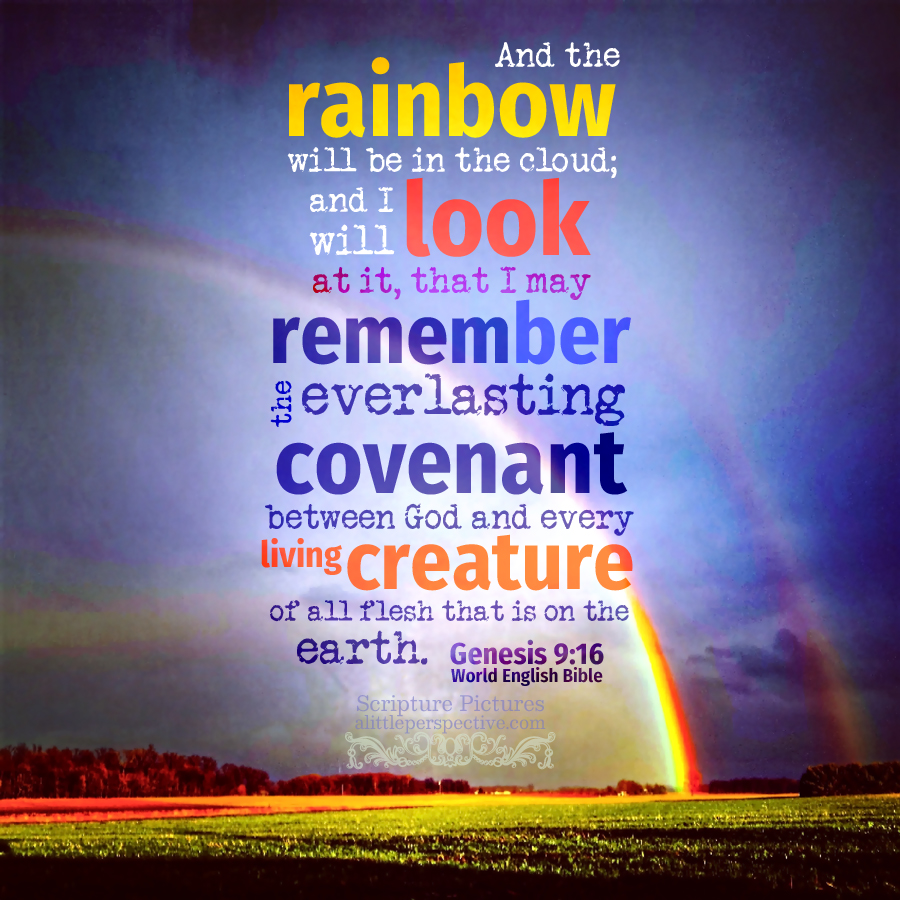Read Genesis 9 at Bible Gateway.
The Hebrew paragraphs:
Gen 8:15-9:7 {s} Blessing on the righteous: be fruitful and multiply
Gen 9:8-17 {p} God’s everlasting covenant with the earth
Gen 9:18-29 {p} Noah blessed Shem and Japheth / cursed Canaan
And the bow shall be in the cloud; and I will look upon it, that I may remember the everlasting covenant between God and every living creature of all flesh that is upon the earth. Gen 9:16
Another powerful Teaching Tool is Hebrew Root Words. Hebrew is a concrete language whose letters began as pictures for everyday objects, such as houses, families, water, sons, baskets, heads, oxen, seeds; which anyone can see and understand, even five-year-olds. Almost all Hebrew words come from three-letter verbs containing the word’s essential meaning. The three-letter verbs tell a parable through its ancient pictures, and that parable helps define that word. For example,
Everlasting is Strong’s H5769, olam, from Strong’s H5956, עלם alam, meaning, ‘to conceal or be hidden.’
ayin ע = eye (watch, know, shade)
lamed ל = shepherd’s staff (teach, yoke, to, bind)
mem מ ם = water (chaos, mighty, blood)
The parable is of the eye (ayin ע) bound (lamed ל) mightily (mem ם), without possibility of recovery, that is, blindness. According to The Ancient Hebrew Lexicon, it is hidden because you cannot see its end. It is beyond the bounds of time and space, thus unending, everlasting, eternal.
Covenant is Strong’s H1285, beriyth, from Strong’s H1262 ברה barah, meaning ‘to cut.’ The final hey was transposed from an original aleph.
bet ב = house (house, household, family, in, within)
resh ר = head of man (head, first, top, beginning, man)
aleph א = ox head (strength, power, leader)
The parable is of the family (bet) of heads (resh), i.e., grain, since the ripe head of a grain stalk is composed of a family of seed heads. Grain (bet + resh) is given to the ox (aleph) or cattle to fatten it for slaughter; and it is this choice animal, the fattened ox, which is used in cutting a covenant.
Why This Matters: Hebrew Root Word parables provide a concrete definition for things that can be vague or ethereal in English, like an ‘everlasting covenant.’ While English struggles to give meaning to abstract concepts, the Hebrew reveals that an everlasting covenant is a vow made in blood that does not end.
If there are questions, these are good resources:
Hebrew root words and their mountain top meanings – Christine Miller
Gen 9 and 10, Nakedness in Genesis and the sons of Noah – Christine Miller

















Leave a Reply